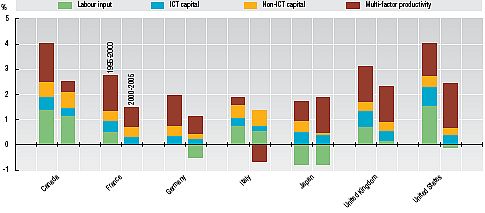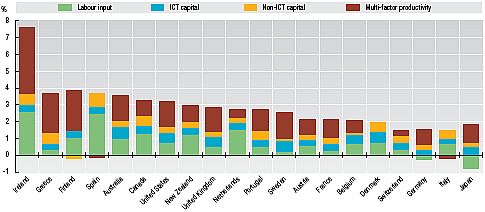I happened to be looking at the 2007 OECD Science, Technology and Industry Scorecard, and noticed a chart on “Growth Accounts for OECD Countries”. I’ve never thought of a breakdown this way, so I was intrigued by the legend.
We naturally think of labour inputs, and capital inputs, but I didn’t realize that there were statistics that break out ICT capital (in blue) from non-ICT capital (in orange). Information and Communications Technologies (ICT) isn’t something that Karl Marx specifically thought about. The OECD reports acknowledges that breaking economic growth down into factors of production is tricky thing.
Economic growth can be increased by increasing the amount and types of labour and capital used in production, and by attaining greater overall efficiency in how these factors of production are used together, i.e. higher multifactor productivity. Growth accounting involves breaking down growth of GDP into the contribution of labour input, capital input and MFP. The growth accounting model is based on the microeconomic theory of production and rests on a number of assumptions ….1
Assuming that we really can break down factors contributing to growth by labour, ICT capital, and non-ICT capital — as well as some multi-factor productivity that can’t be broken down — what does it look like? Look at the blue bar in the view of the G7 countries …
Contributions to GDP growth, G7 countries, 1995-2000 and 2000-05
(percentage points)
… and a view of all OECD countries …
Contributions to GDP growth, OECD countries, 1995-2005
(percentage points)
Without squinting to make out all of the details, ICT capital (in blue) represents a non-insignificant contribution to growth.
In trying to understand what ICT capital was about, I referred back to a 2000 OECD report on A New Economy? that seems to be a foundation for the focus on ICT.
Investment in ICT is making an important contribution to growth and labour productivity growth across the OECD. The 1990s witnessed rapid accumulation of ICT equipment. In the G7 countries (and most likely in other OECD countries as well) ICT investment progressed at two-digit figures over the past two decades and accounted for 10-20% of total non-residential investment in the business sector. However, while computers seem to be everywhere, use of ICT is actually concentrated in the services sector and a few manufacturing sectors.2
The relationship between ICT, the services sector, and innovation is underscored a little further down.
The services sector is by far the main purchaser of ICT equipment and its performance has been particularly affected by the take-up of ICT. Services sectors such as finance and business services lead in investment in ICT and many services are now highly innovative. Moreover, services have become more tradable, with the result that they are more exposed to competition and are led to innovate to improve the quality of service offered and therefore remain or become competitive.3
In the context of Services Science, Management and Engineering, ICT isn’t the only factor in services, but it is a significant factor that wasn’t on anyone’s chart 25 years ago.
1OECD Science, Technology and Industry Scoreboard 2007: Innovation and performance in the Global Economy, p. 206, available from oecd.org.
2A New Economy? The Changing Role of Innovation and Information Technology in Growth, OECD, 2000, p. 10, available from oecd.org.





